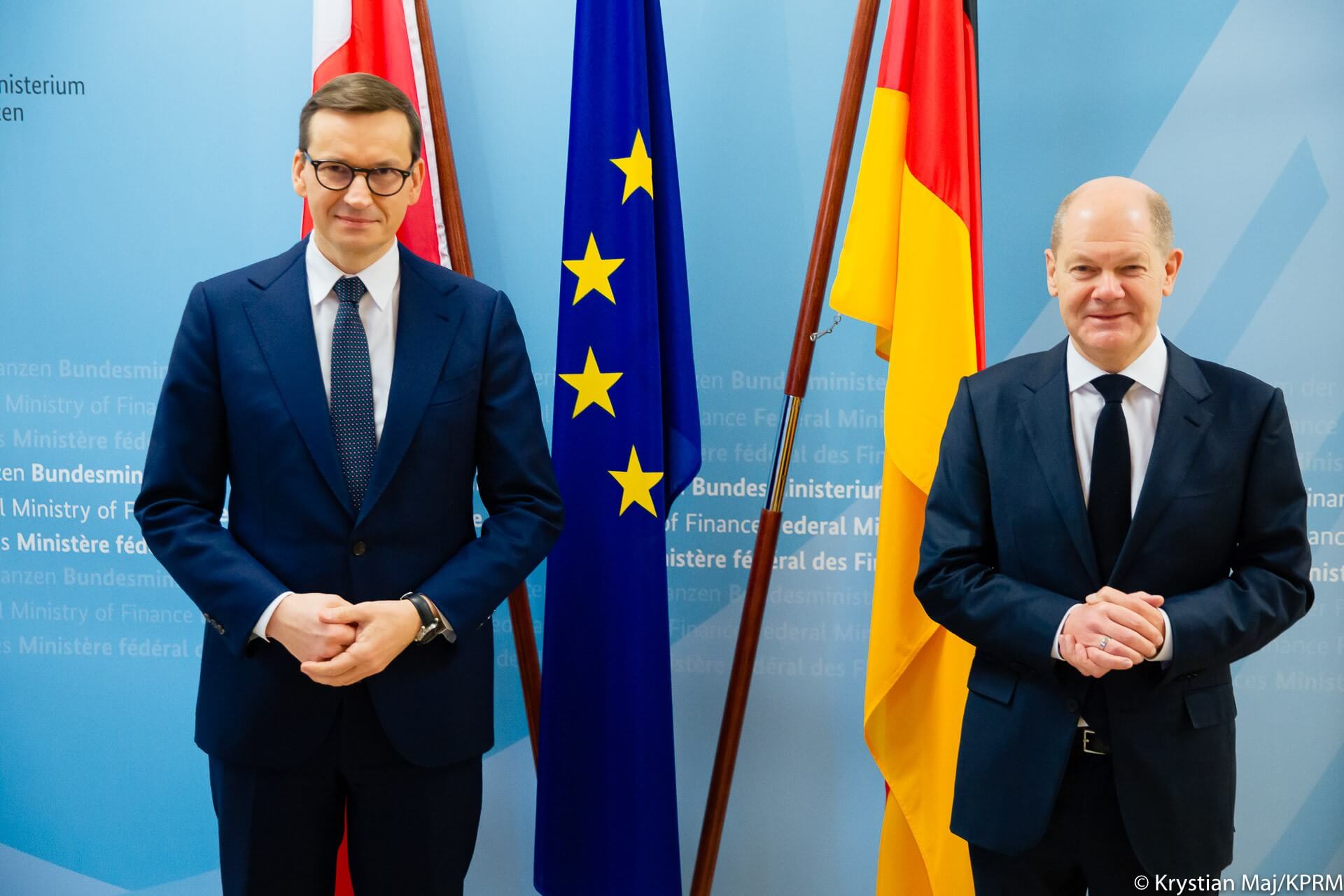On Sunday, new German Chancellor Olaf Scholz paid an inaugural visit to Warsaw during which he sought to deepen ties with the Polish leadership despite its recent disagreements with the European Union (EU).
Ahead of their talks, the Polish Prime Minister (PM) Mateusz Morawiecki received Scholz with full military honours in front of the PM’s office. The leaders reportedly discussed Russia’s aggression against Ukraine, Belarus’ hybrid attack against the EU, and the Nord Stream 2 gas pipeline.
🇵🇱🇩🇪 PM @MorawieckiM and Chancellor @OlafScholz met to discuss EU issues, migration, energy and the situation on the EU's eastern border. pic.twitter.com/XzrWF6wHUm
— Chancellery of the Prime Minister of Poland (@PremierRP_en) December 12, 2021
During a joint press conference with Morawiecki, Scholz noted Europe’s intolerance for attempts to undermine the territorial integrity of European countries. To this end, Scholz said, “We’re watching the troop movements along the Ukrainian border with great concern, and we are making it very, very clear that the borders in Europe cannot be violated and that we consider the integrity of the borders of countries to be inviolable — and that no one should think that they could simply be violated without serious consequences.” In recent months, Russia has amassed at least 100,000 troops near Ukraine, indicating a possible invasion of the former Soviet country.
Next, regarding the migration crisis, Scholz accused Belarusian President Alexander Lukashenko of launching a hybrid attack against the EU to retaliate against sanctions imposed by the bloc over human rights abuses and electoral fraud. He thus backed Poland’s efforts to stop the flow of thousands of migrants into the bloc and also called Lukashenko’s act of encouraging migrants from the Middle East to enter the EU and camp at Poland’s border “inhumane.” Likewise, Germany’s new foreign minister, Annalena Baerbock, also backed Poland on the migrant crisis during her visit on Friday.
🇵🇱🇩🇪 PM @MorawieckiM at press conference with Chancellor @OlafScholz: We discussed potential sanctions which will be on the table at the next @EUCouncil, in order to make the Lukashenko regime and its Kremlin principal realise that we are determined to defend our eastern border. pic.twitter.com/oLyrRd19uu
— Chancellery of the Prime Minister of Poland (@PremierRP_en) December 12, 2021
Apart from this, both sides discussed Poland’s dispute with the EU over the rule of law and the superiority of EU law. During his meeting with the Polish counterpart, Scholz said that the 27-member bloc remain united about the importance of preserving principles of democracy, and urged Poland to arrive at a pragmatic solution to resolve its outstanding dispute with the bloc over the rule of law and principles of democracy.
As it stands, the European Commission is withholding the delivery of pandemic recovery funds to Poland over the issue. Additionally, the European Court of Justice has imposed fines on Poland for introducing judicial reforms that violate EU law and erode the independence of Poland’s judicial system. Poland has refused to pay the fines and insisted on the precedence of Polish law over the EU rules.
Concerning energy, Poland reiterated its opposition to the Nord Stream 2 undersea natural gas pipeline that connects Germany and Russia. Poland said the pipeline makes Europe dependent on Russia for energy and allows Russia to ramp up pressure on Ukraine.
🇵🇱🇩🇪 PM @MorawieckiM at press conference with Chancellor @OlafScholz: I drew the Chancellor's attention at the risks of opening Nord Stream 2 and how the scenario we warned about is unfortunately coming true. pic.twitter.com/oQtqkcjGXo
— Chancellery of the Prime Minister of Poland (@PremierRP_en) December 12, 2021
In response, Scholz reiterated that the pipeline is purely an energy project whose value would diminish with the development of renewable energy sources. Moreover, Germany’s energy regulator has temporarily suspended the certification of the pipeline, citing non-compliance with German law. Scholz is also under pressure from Ukraine and the United States to shut down the pipeline if Russia invades Ukraine.
In addition, Scholz said he would support plans ensuring Ukraine’s position as a transit country while aiding the country’s transition to green technology. He said, “We continue to feel responsible for ensuring that Ukraine’s gas transit business remains successful.”
Sunday’s meeting marked the 30th anniversary of the “Treaty of Good Neighbourship and Friendly Cooperation” between Poland and Germany, signed on June 17, 1991. At the end of the visit, Scholz laid a wreath at the Tomb of the Unknown Soldier, a memorial for soldiers who gave their lives for Poland.

